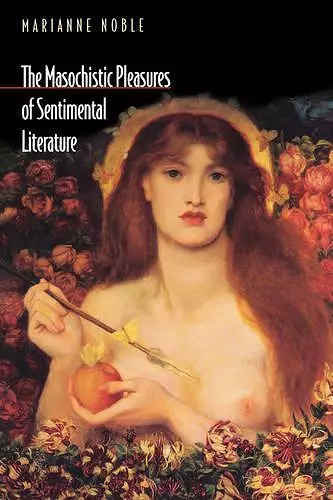The Masochistic Pleasures of Sentimental Literature
Format:Paperback
Publisher:Princeton University Press
Should be back in stock very soon

A well-written and sophisticated study of nineteenth-century female masochism and its expression in the writing of middle-class American women of the period. Marianne Noble's plan is impressive: she is at once a thoughtful theorist and an admirable close reader of texts. The result is a work that engages in an illuminating and thought-provoking manner with extremely complex issues. -- Suzanne Juhasz, University of Colorado Marianne Noble's book is the first study of sentimentality in American women's writing to go decisively beyond the impasse created by the Douglas-Tomkins debate. It brings acute and sophisticated perception to the study of a group of writers whose fate has frequently been to serve as stalking horses for other issues, rather than as objects of individual study in themselves. As a psychoanalytically oriented text, it is remarkably clear and persuasive, using theory to illuminate the dynamics of masochistic fantasy without obscurantism. This is a wonderful book. -- Paula Bennett, Southern Illinois University
Argues that tropes of eroticized domination in sentimental literature must be recognized for what they were: a double-edged sword of both oppression and empowerment. This book explores the cultural forces that created this ideology of desire, particularly Protestant discourses relating suffering to love and middle-class discourses of womanhood.For generations, critics have noticed in nineteenth-century American women's sentimentality a streak of masochism, but their discussions of it have over-simplified its complex relationship to women's power. Marianne Noble argues that tropes of eroticized domination in sentimental literature must be recognized for what they were: a double-edged sword of both oppression and empowerment. She begins by exploring the cultural forces that came together to create this ideology of desire, particularly Protestant discourses relating suffering to love and middle-class discourses of "true womanhood." She goes on to demonstrate how sentimental literature takes advantage of the expressive power in the convergence of these two discourses to imagine women's romantic desire. Therefore, in sentimental literature, images of eroticized domination are not antithetical to female pleasure but rather can be constitutive of it. The book, however, does not simply celebrate that fact. In readings of Warner's The Wide Wide World, Stowe's Uncle Tom's Cabin, and Dickinson's sentimental poetry, it addresses the complex benefits and costs of nineteenth-century women's literary masochism. Ultimately it shows how these authors both exploited and were shaped by this discursive practice. The Masochistic Pleasures of Sentimental Literature exemplifies new trends in "Third Wave" feminist scholarship, presenting cultural and historical research informed by clear, lucid discussions of psychoanalytic and literary theory. It demonstrates that contemporary theories of masochism--including those of Deleuze, Bataille, Kristeva, Benjamin, Bersani, Noyes, Mansfield--are more relevant and comprehensible when considered in relation to sentimental literature.
One of Choice's Outstanding Academic Titles for 2000 "This book does an admirable job of assessing the cultural and libidinal values attached to sentimental fiction and its prevalent tropology of erotic domination in 19th century writing by women."--Virginia Quarterly Review "[A] complex, nuanced volume ...Though the author abundantly documents the oppressive aspects of fantasies of masochistic desire, she also traces the kinds of power and pleasure produced in works that eroticize female attraction to pain and submission to male domination."--Choice "Noble's flexible and dazzling close reading of Stowe, Warner, and Dickinson are artful, and she usefully demonstrates that exploring the variations of individualistic psychological response is key to understanding the work of sentimental discourse."--Rebecca Wanzo, American Literature
- Short-listed for Choice Magazine Outstanding Reference/Academic Book Award 2000
ISBN: 9780691009377
Dimensions: unknown
Weight: 397g
240 pages